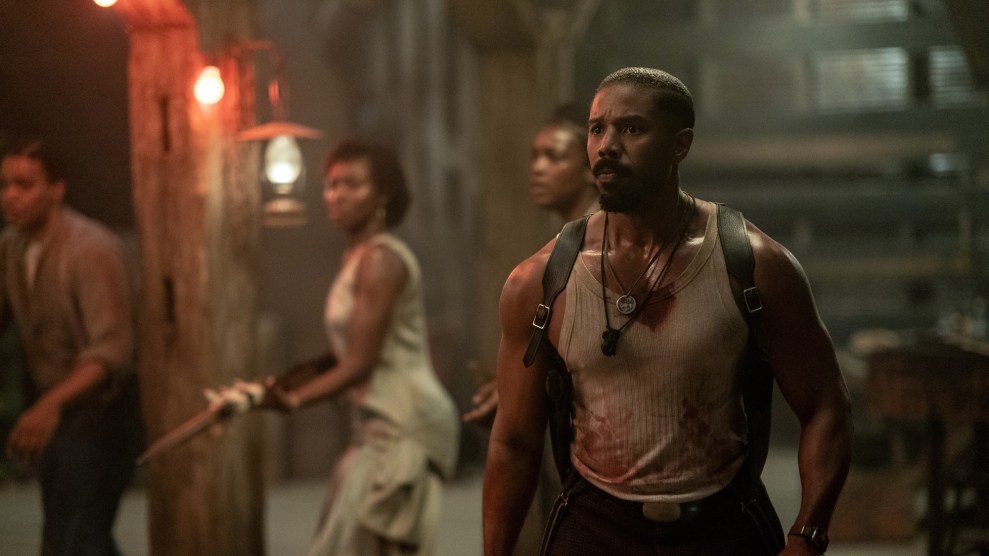
In 2004, Jeff Smith, a short, skinny 29-year-old, ran a quixotic primary race to fill veteran Missouri Democrat Dick Gephardt’s spot in the House of Representatives. Smith, a Washington University political science professor with a high-pitched voice and a slight lisp, had no name recognition, no family support, no cash, and no love from the local media. But he went for it anyway, and filmmaker Frank Popper got the whole thing on tape.
The result is Can Mr. Smith Get to Washington Anymore?, a documentary that accomplishes simply what many tales from the campaign trail do not: It makes the race seem tangible, gritty, and unpredictable. The film, which won the 2006 audience choice award at the Silverdocs film festival, airs as part of the PBS series “Independent Lens” on February 27.
Popper seems to feel a kinship with Smith from the get-go. The two share a “screw what they say, I’m doing it anyway” attitude. Popper is a former high school English teacher who wandered into a photo lab one day and thought the medium looked cool. Photography led to multimedia, which led to film. Smith, an academic who had never run for office before but jumped right into it, must have been easy for Popper to relate to: He kicks off his campaign by walking up to people’s porches to introduce himself, pitch his progressive candidacy, and debate the issues. He assembles a ragtag group of inexperienced campaigners in their early 20s. He leads campaign meetings at fast-food restaurants, and has nonstop phone conversations with his constituency and his crew. Howard Dean even shows up to introduce Smith at a town hall meeting and pledge support for the little guy.
Slowly, Smith’s youthful and vibrant grassroots campaign grows to 500 volunteers, and the energy level rises. He wins over female senior citizens, young couples, and the neighborhood basketball players he plays pickup games with. (Smith is a decent baller.) Stickers, signs, and T-shirts get made, full-color glossy flyers get distributed, and a short promotional film gets delivered to doorsteps. As the race pushes forward, Smith finds himself with a healthy fan base, favorable support in the polls, and a decent chunk of change in his campaign fund.
Then things go wrong. Smith teams up with fellow candidate Joan Barry to produce and distribute “smear sheets” against their main opponent, strong-chinned state representative Russ Carnahan. Smith’s aggressive move is his biggest blunder. Until that point, his tactics appeared genuine, earnest, and focused on his ideas and goals—not targeted at the alleged shortcomings of his key competitor. Overnight, he transforms from eager beaver to growling tiger. Carnahan, a member of Missouri’s most powerful political family and a likely primary shoo-in, retaliates by publishing flyers denouncing Smith and Barry and slyly claiming they are “in bed together.”
Soon afterward, local newspapers throw their support behind Carnahan. Smith then loses a key endorsement from a leading black newspaper in St. Louis. He had naively believed that he could capture the black vote simply because he had a degree in African American studies and friendships in the community. But as a St. Louis Post-Dispatch writer explains, the black vote went to the candidate with the most money and power, in hopes of actually winning the fall election.
Carnahan wins the primary, but with only 22 percent of the vote, just a point more than Smith. The next day, Smith and his friends share tears and a group hug in the rain outside a Subway outlet, and Smith is later shown riding his bicycle back to work with his signature shirt and tie on. (Carnahan won the general election, too.) Since the film was shot, Smith has gone on to reach his goal—sort of. He didn’t make it to Washington, D.C., but he’s now a state senator for Missouri’s 4th District, representing the western portion of St. Louis, and reportedly rattling a few chains.
Popper’s documentation of Smith’s failed primary campaign feels like a living, breathing civics lesson. But had the bright-eyed, inexperienced Smith won, it would have felt like an after-school special. His loss is expected—predetermined, even. Politics often seems like a pragmatist’s game that idealists and dreamers have no business playing. When a lisp goes up against a prominent chin, whom are you going to vote for?
















